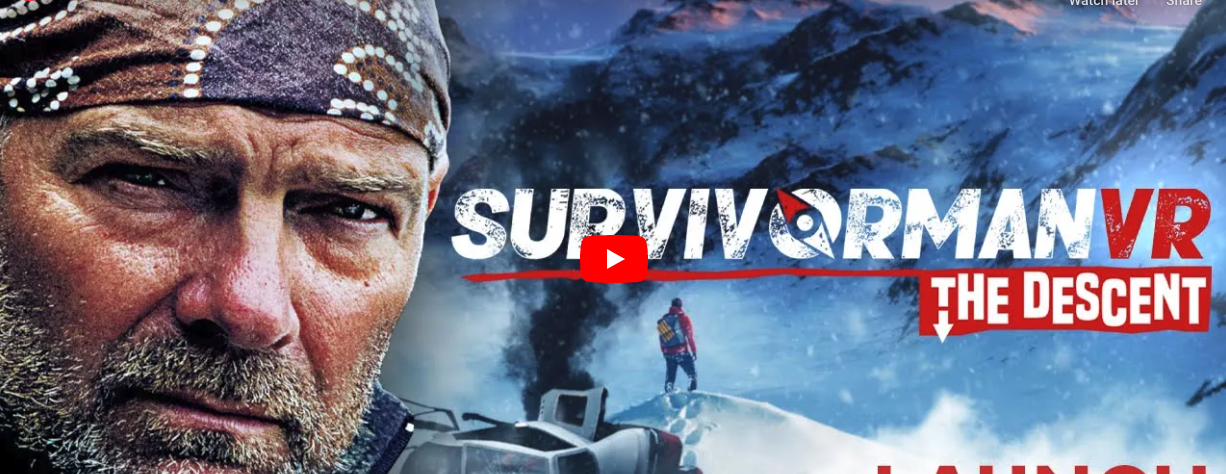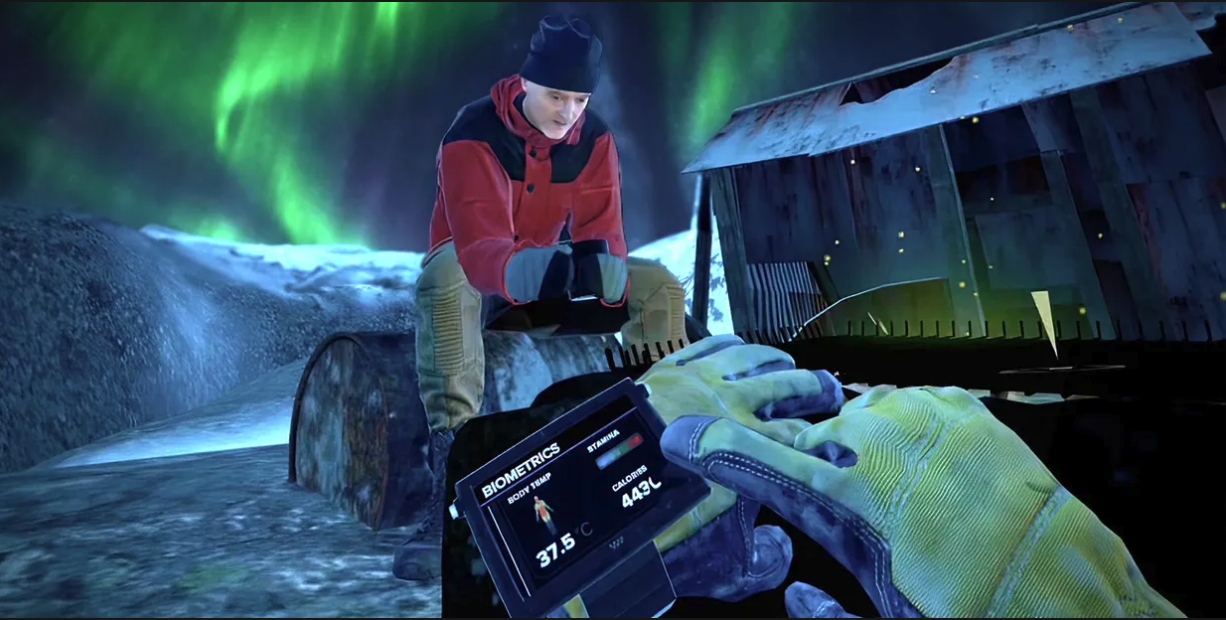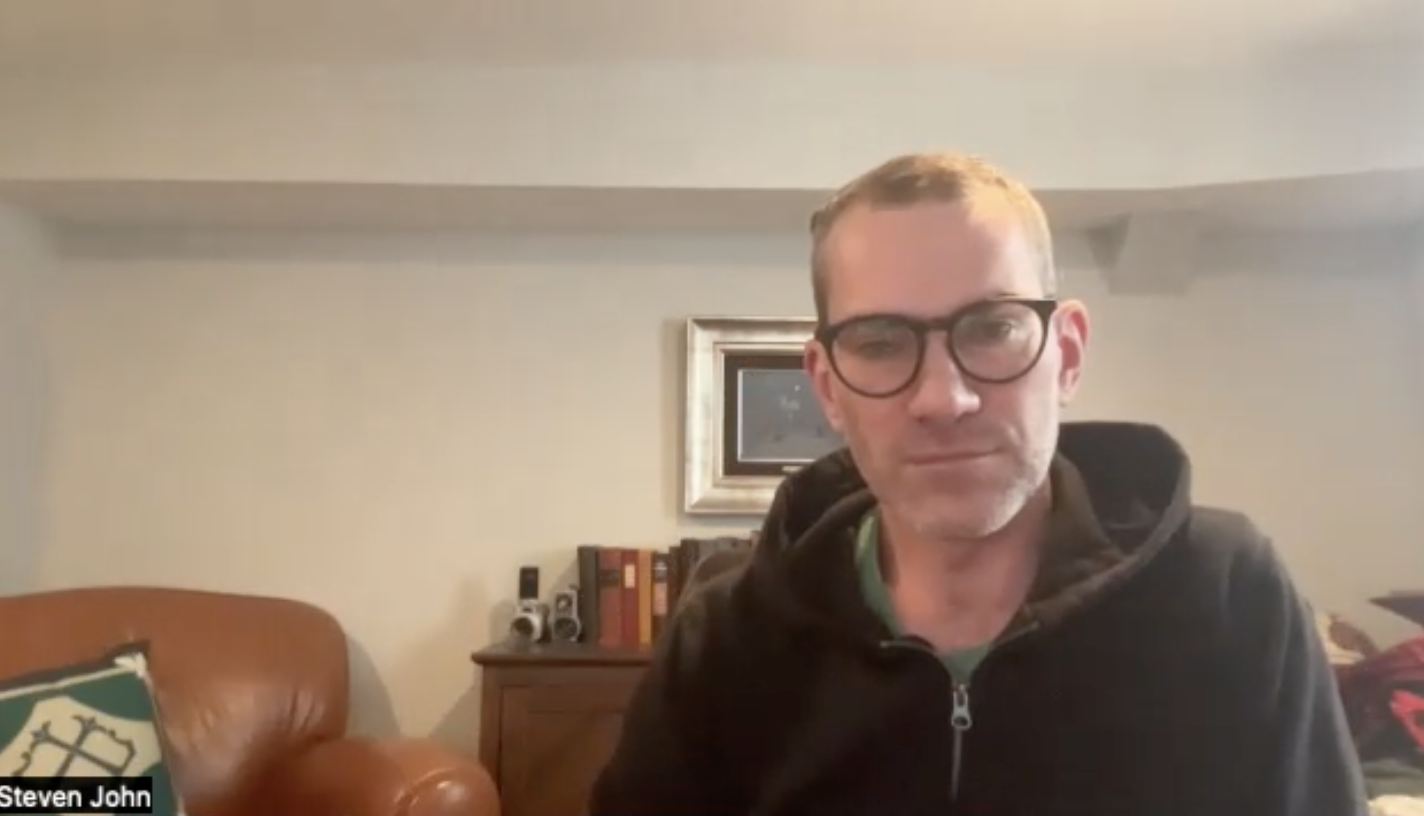
SURVIVORMAN LES STROUD MADE A VR GAME ALL ABOUT SURVIVAL, AND HE TOLD US ALL ABOUT IT
I’ve been a fan of “Survivorman” Les Stroud’s work for more than 15 years, and I’ve had the pleasure of interviewing him about a half dozen times over the past five years. We’ve talked about everything from hiking boots (he and I both favor Asolo boots, it turns out), wild foraging, and of course about his many different television projects.
This time, though, we were talking about a game — his game. That’s the survival-oriented VR adventure game Stroud created with Toronto-based Cream Productions. It’s called Survivorman: The Descent, and in the game, well, why don’t I let it speak for itself…
“You survived a helicopter crash on a mountain, with nothing around but snow and the aircraft wreckage. As the only survivor, you must rely on your ingenuity and skills to use what's around you to make it down the mountain alive, before you freeze to death. But fear not; you are joined by survival expert Les Stroud, who appears as a vision, to guide you (or mock you as you fail). Survivorman is a game of endurance, smarts and skill, with challenges based on real-world survival scenarios.”

So, some lighthearted fun, right? Actually, the game is a lot of fun. And it might just teach you some skills that could save your life. When I caught up with Les earlier this year, we talked through it all, from the inspiration to the creation to what he hoped Survivorman: The Descent would mean for its players.
STEVEN JOHN: What was the motivation for Survivorman: The Descent?”
LES STROUD: Well, you can imagine that over the years, the concept and the idea of doing a Survivorman video game oriented sort of thing has always come and gone, and it's never really been possible . It was: “Well, the budget needs to be $32 million.” That's not going to happen. Or it's so low grade that it's just going to be beneath the quality of what I try to do with Survivorman. And then along comes my old partner actually, in filmmaking, which was Cream Productions in Toronto, my buddy Dave Brady. And he said: “We're working on this whole VR thing, and really it's really becoming part of the company. And we just think launching with Survivorman would be ideal.” And I couldn't agree more, and two years later of development, two and a half years, here we are.
SJ: So, is it something you've been interested in for quite a long time and it finally just came together?
LS: Sure. I mean, it always made sense. I mean, it's just another, look, I'm no technophobe. I use modern media in many ways in forms, and it's how I first became in love with nature, it was watching Jacques Cousteau and Tarzan movies. So it's just another angle of easing into people's lives, the concept of connecting with nature.
SJ: How did you pick and develop the story from the helicopter crash and the descent down the mountain?
LS: That was Andrew, Andrew McDonald, who actually was the game developer, head developer on it. In a situation like this, I let the people who know better in terms of what they're doing technically take the lead. This was about what's going to work well for VR, and that's where his brain was at. And I said, sure. Arctic Survival helicopter crash. Got it, next. And we could go anywhere and do so many different things that I like to let him have the lead, because then I know he's zoned in on it and excited about it, rather than me saying: “Well, we should start with basic survival in the woods of Ontario, Canada, when really there was no need for me to do that.”
SJ: Is there a primary intended player or is this meant to be geared to a broad audience?
LS: Broad audience for sure. Because in many ways, this is for me more like a simulation. If you think helicopter simulation, people learned how to fly helicopters — they go on helicopter simulators at first, and I sort of see it the same kind of way. I mean, yeah, it's a game, I get it. But more than a game, it's really more about survival simulation than anything else.


SJ: OK, You've basically anticipated and answered my next question, but I'll still ask it just because I've got it all written out so well. Is the game primarily intended as entertainment that also informs or as a training tool that is also fun and engaging?
LS: I'd say more like a training tool that's also fun and engaging. You get to experience certain aspects of cold and hungry and thirsty and all that sort of stuff, and shelter-building without ever leaving your living room kind of thing. So there's a lot of suspension and disbelief with this. But yeah, the second part of what you said, sure.
SJ: So, what were the biggest challenges making the game and what were the biggest surprises and what was the most fun?
LS: The biggest challenge for me first off is that can this not look even cooler in my brain? I'm thinking, can it loo rightk? Well, of course what I'm thinking of is maybe a game I played that cost $32 million to produce. Yes, of course, or what Marvel can do or something like that. But we didn't have a budget like that. And so that was a challenge for me. And then the second challenge more specifically was for the developers, because they would say: “Oh, what about snaring a rabbit?” And then they'd set it up and I'd go: “Well, that's not how you do it.” So after they've spent weeks or months working on something, I would hold their feet to the fire every time saying: “I get it. I know why you'd like to have that in there, but sorry, man, that never happens in survival. Sorry. No.” Or: “You can't go from tinder glowing to flame that quickly. It doesn't happen like that.” So I would hold their feet to the fire and that was challenging for them anyway. For me, I'm just like, nope. So I got to be the last filter; I had the veto power and they were phenomenal about it. So that was the challenges. Second part of that question was...
SJ: Just what were the surprises and what were the most fun parts?
LS: Surprises and most fun surprises were probably for me, mostly just technically how this all works out, which is way too complicated to get into right here in this conversation. But it is a big complicated world building a video game or a simulation, very big, complicated world, and what do I know? That's not what I do. Also, I suppose a surprise was just how willing they were to bend, say it this way, to bend to my wishes because I would say: “Nope, that doesn't work that way. Why don't you do it this way?” And then the most fun, I guess, really was getting to dress up in motion capture suits and doing narration, getting to do that and act out certain scenarios and getting to be right in the game with you. And sure, the avatar is not perfect. There’s been criticism, it doesn't really look perfect, it's not a perfect representation of you and your face. I get it. But come on, man. We're not spending $32 million on this, so it's pretty darn close to it. And that's a lot of fun, seeing me pop up on screen and go: “OK, you're not getting this. If you're going to get your fire going, you got to start from the base.” So I get to ride you a little bit and say, come on, dude. Or congratulate you when you get something well done. So that was fun for me.
SJ: Sure. Moving beyond the game a little bit, what are a few pieces of survival wisdom you wish you could impart to everyone? The simple things along the lines of you sweat, you die.
LS: Survival is proactive, not passive. Now granted, there are times, depending on the variables, when sitting still matters, but a lot of times, even if you're sitting in one place waiting for rescue, proactive survival is important, huge. And I will always say what can you be doing to better your circumstances? You should always be bettering your circumstances no matter what. You walk past some firewood, pick up a piece. I used to say in camping, if I was a guide: “I don't ever want to see any of you guys come back to camp without a piece of firewood in your hand, just one. I don't care if it's a stick, just one.” So that's always vital. And then another one, an adage would be in survival, you are always either dealing with weather or preparing for weather. Always. There's never a moment where it's not one of those two.
SJ: What are a few survival tools you think people should always have on hand? I know you always have your trusty multitool, orange trash bag when you can, but what are a few things? Maybe even just to keep in the car, even if you are not planning to be out in the woods, that just people should always have on hand?
LS: Well, on a serious survival side of it, I would answer a way to get a fire going. Always, always. We get all machismo about our knives. I'll leave the knife at home, let me take a lighter, anything so that I can get an easy fire, because that is always the most vital thing. I mean, gosh, you know what I use my knife for mostly when I'm wilderness traveling? Putting peanut butter on my bagel, that's what I use my knife for, my big beautiful bush knife. So in survival, you're trying to protect your knife. So a way to get a fire going is number one. And then on the more easier side of it in your car and so on, yeah, that extra little supply of food and water matters, but one that's overlooked a lot, a way to signal. Do you have a way to signal people? Is it appropriate that you might have a flare in this situation? When I dive, I have a little underwater scuba diving kit. It's watertight. I open it up. I'm stuck somewhere because the boat didn't come and get me and I was going around this island and doing a scuba dive? There are flares inside that little kit and matches. So a way to rescue, to signal for help, always gets overlooked in a survival kit and it's vital.
SJ: OK, very good. What are a few of the most common mistakes people make when they're stranded in the wilderness? It might be just sitting under a tree, waiting for waiting for help, maybe?
LS: That's a big one, yes, doing nothing. Another one would be not paying attention to water consumption. Taking it for granted. That can be extremely vital depending on where you are. In fact, in many ways I would say that water and the need for it dictates the rest of survival. It's like using a punt, if you will. It's a watershed down from that as far as how you're going to be surviving. And so you have to pay close attention to that.
SJ: And I believe you've said this in the past, but a lot of times people will make the mistake of conserving too much water. Is that correct? Keeping some in your bottle when you're already dehydrated and you should just consume it?
LS: Yeah. The idea of sipping, I dunno, for me, if it's I've got four ounces of water, I'm going to put those four ounces in my body. Now it's when you're in around that level of where there's not a lot of water, I've got a glass of water for the day, I'm going to drink the glass of water and keep it in my body and let it be in my system. And hopefully it's like basically drink as much as you can without needing to go pee. Got it. You can find that balance now. Your body's using the water. That's the better place to keep it, in your body, so long as you're not voiding it.
SJ: What are a few of the places on earth you have yet to visit that you still want to see
LS: Oh, definitely Tibet. That’s a big one for me. Never been to Antarctica. I would like to do that trip, but as a tourist is how I would like to do it. So yeah, those two for sure, because I've been around to so many other places.
SJ: And then with that in mind, are there any places or environments, and you might've already been there once, but that you think are simply too dangerous to even try a survival ordeal in or that you certainly would not return to?
LS: I would not return to being stuck in a life raft on the ocean again.
SJ: I saw that one…
LS: Yeah, no, thanks. That was miserable. And then the answer to the other part of the question is based on people will say, like: “You should be on the side of a volcano!” Why would I do that? Granted, you could break a leg and be stuck on the side of a volcano, but that's not surviving. That's dying slowly and hoping for rescue. So I always chose places and situations that were realistic to us as humans, things we do, going fishing and getting stuck and going hunting and getting lost, those sorts of things. So that was the thrill for me. Some people would mistake it for an adrenaline big survival challenge. It was never that for me. For me it was about connecting to nature. And these are simply great skills that can facilitate your comfort level when you're out in nature.”
SJ: It's funny, I was interviewing the climber, Alex Honnold a couple of weeks ago, and he was saying one of the things that always bothers him is how people think of mountain climbing as so extreme. He was like, it's actually very chilled out and you're just connecting with nature. You're just taking it easy. So that's similar to what you're saying, it's not about the adrenaline, that's about the real experience when you're not creating content for a survival game or a show or a book. What are your personal favorite outdoor activities these days?
LS: I hike a lot, I’m constantly hiking with my dogs and my wife. We do a ton of backpacking, a ton of snowshoeing. And I'm focused. I have so much music coming out in the next two to three years. Just every week, every few days almost, there's a new song and every week there's a new video, it’s constant. So now for years, the way I would do music and nature is that I wouldn't do music in nature. I would be in nature. I'd come home and I would let that distill into a song sitting with a candle on the coffee table and a glass of wine and playing. But I want more and more now to go, I'm going to switch, I'm going to flip that on my own self and sit out there and in a meditative place with my guitar and nature. So, that's another thing that I am doing more of now is getting out there with my guitar and playing. And I'm still an underwater diver. And the thing is, Steve, it's really hard for me to turn off the nerd in me when it comes to survival. If you and I were to go hiking this afternoon, even with no survival in our minds at all, we're just going out for a hike at some point I'm going to go: “Hey man, do you mind if I geek out for a second?” And if it's my wife for example, I'll go: “If you got stuck here, where would you survive?” Maybe I saw something cool and I'm like: “Oh man, I'm being a geek again. I, oh, here I go.” Because I came from being a survival nerd when it was not cool and it was not on TV and nobody was doing it. It was me and a weekend of a few people doing a course in college on survival, total nerding out, I'm still that nerd. So, I don't go out and survive. I don't do that anymore. I don't need to. 70, 80 times I've done it, I don't need to. But I still have that nerd inside of me when I am out there.
SJ: I know you've done Survivorman and sound and things like that, but have your kids taken to the outdoors as much as you did? And if so, what are your favorite outdoor things to do with them?
LS: Yes, absolutely. My wife at the time, their mom, we had them out in, I mean my daughter was in a canoe when she was five months old, there at the front with diapers on. Cloth diapers. We were sea kayaking, the north shore of Lake Superior, taking my son to canoe tripping. So they got that instilled within them young. I highly urge your readers to instill it young, instill it early, instill it often to get your kids into it. And if you're not into it, then programs through school and so on, scouting, whatever, scouting is a phenomenal way to do it. Get your kids out in nature. So, it was in there and I can see that it come out in them now. I can see their love of adventure, but they don't want anything to do with survival or filmmaking for that matter. My son is a smoke jumper. Well he actually is a rapeller, he rappels out of helicopters to fight wildfires and serves as a paramedic. And he climbs mountains. And my daughter is a bike racer, a cycle racer, and she is always off into nature as well. So they definitely have the adventure bug, Again, I urge all parents that get them out there young. Someone asked me how once about their three-year-old daughter, and I said: “You got a backyard? Yeah? You got a lawn? Yeah. OK, let your three-year-old daughter sit out on the back lawn on the grass, let her pull a worm out and break it off and come home crying. Let that happen. And then the kids connect with nature so easily. It's our fears that make them afraid of nature. But on their own they'll pick up leeches and giggle.


